The Abbey of Santa Maria Di Cerrate stands as a remarkable example of Puglian Romanesque architecture, nestled in the historical landscape of Lecce. Founded by Bohemond I of Antioch, this 11th to 12th-century site flourished as a cultural center until a Turkish pirate raid in 1711 led to its decline. Today, restoration efforts have breathed new life into the abbey, inviting visitors to explore its stunning 13th-century Byzantine frescoes and rich agricultural heritage. However, what truly sets this site apart are the stories hidden within its walls, waiting to be uncovered.
Key Points
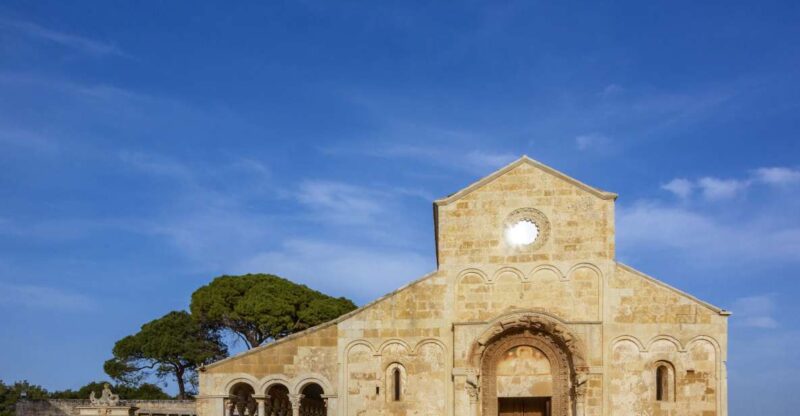
- The Abbey of Santa Maria di Cerrate features Puglian Romanesque architecture and stunning 13th-century Byzantine frescoes.
- Founded by Bohemond I of Antioch, the abbey served as a cultural hub in medieval Lecce.
- Guided tours in Italian and English are available, lasting about one hour, with an entry fee of K€21.5.
- The abbey reflects the region’s agricultural heritage, showcasing remnants of traditional farming practices.
- Accessibility features include wheelchair access, accessible restrooms, and designated parking for individuals with disabilities.
Overview of the Abbey
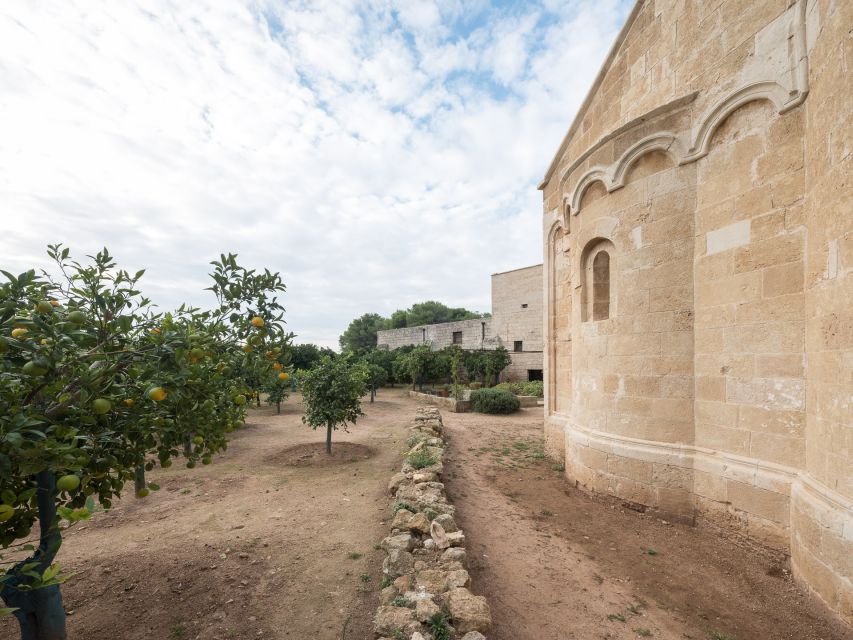
The Abbey of Santa Maria di Cerrate, a striking Greek Orthodox monastery in Lecce, showcases Puglian Romanesque architecture and features stunning 13th-century Byzantine frescoes that captivate visitors.
Nestled in a serene garden, the abbey offers a glimpse into a rich artistic heritage. Visitors can explore the site with a live tour guide available in both Italian and English, enhancing their experience as they explore the abbey’s beauty.
Entry costs K€21.5 per person, and the visit typically lasts about an hour. The flexible cancellation policy allows free cancellation up to 24 hours in advance for a full refund, making it easy for travelers to plan their visit.
This enchanting location truly invites exploration and appreciation.
You can also read our reviews of more tours and experiences in Lecce.
Historical Significance
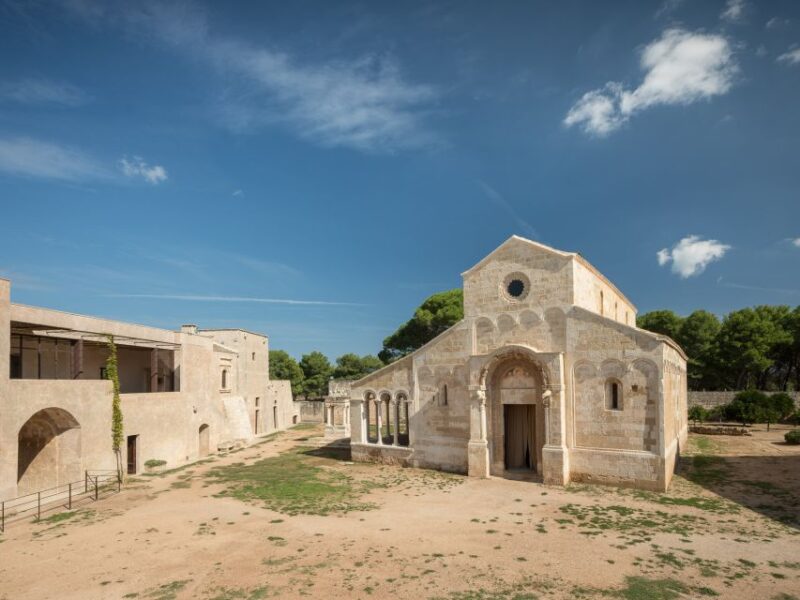
Founded by Bohemond I of Antioch between the 11th and 12th centuries, the Abbey of Santa Maria di Cerrate served as a vital center for the Basilian monks of the Greek Orthodox rite.
This monastery became a cultural hub, housing a library and a scriptorium dedicated to transcribing ancient texts, fostering education and scholarship in the region.
However, the abbey faced challenges, particularly after a Turkish pirate attack in 1711, which led to its abandonment.
Despite this setback, restoration efforts began in 1965, with ongoing work since 2012 aimed at preserving its rich heritage.
Today, the abbey stands as a testament to its historical significance, highlighting the intersection of faith, culture, and education in medieval Lecce.
Architectural Highlights
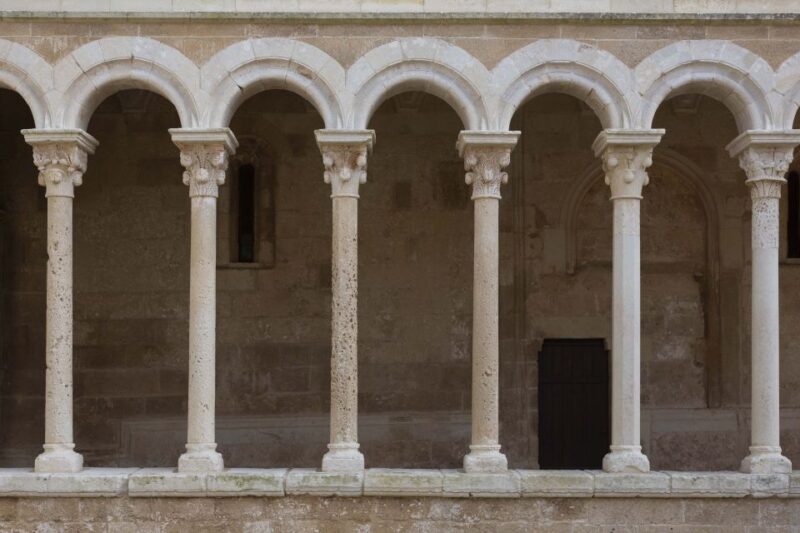
Puglian Romanesque architecture shines through at the Abbey of Santa Maria di Cerrate, showcasing intricate details like its 13th-century loggia and exquisite Byzantine frescoes.
The abbey features stunning white Leccese stone capitals that exemplify the region’s unique craftsmanship. Visitors are captivated by the harmonious blend of Romanesque sculpture and the vibrant colors of the frescoes, which depict religious scenes and figures.
The 16th-century well adds to the site’s charm, serving as a testament to the abbey’s historical functionality. Each architectural element tells a story, drawing visitors into the rich history of this sacred space.
Agricultural Heritage
Nestled within its historical grounds, the Abbey of Santa Maria di Cerrate showcases a rich agricultural heritage, reflecting centuries of olive, wheat, and tobacco cultivation. The site features remnants of workplaces, farmhouses, stables, and underground mills, illustrating a vibrant agricultural past. This heritage not only highlights the abbey’s role in local economy but also emphasizes traditional farming practices still valued today.
| Crop | Historical Significance | Modern Relevance |
|---|---|---|
| Olives | Vital source of oil for centuries | Key ingredient in cuisine |
| Wheat | Staple food for local populations | Basis for traditional bread |
| Tobacco | Once a major cash crop | Cultural significance |
| Livestock | Provided essential resources | Supports local farming |
| Vineyards | Important for wine production | Boosts local tourism |
Visitor Information
Visitors to the Abbey of Santa Maria di Cerrate can enjoy a rich experience that includes guided tours, stunning architecture, and a glimpse into the site’s agricultural heritage.
Tickets are priced from K€21.5 per person, offering options for adults, youth, infants, and students. Each tour lasts about an hour and features knowledgeable guides fluent in both Italian and English.
Guests can explore the abbey’s impressive Puglian Romanesque style and Byzantine frescoes at their own pace.
Dogs are welcome in the garden and courtyard on a leash, while only guide dogs or small dogs are allowed inside the abbey.
With an overall rating of 4.7 out of 5 based on six reviews, visitors can expect an enriching cultural experience.
Accessibility and Amenities
The Abbey of Santa Maria di Cerrate offers a range of accessibility options and amenities to ensure a comfortable visit for all guests. Visitors can expect a welcoming environment with facilities designed to accommodate various needs.
Key features include:
-
Wheelchair access to key areas of the abbey
-
Accessible restrooms available on-site
-
Designated parking spaces for individuals with disabilities
-
Clear signage throughout the premises for easy navigation
-
Assistance from staff members upon request
These amenities make the abbey a more inclusive destination, allowing everyone to appreciate its historical and architectural significance.
With thoughtful planning, the Abbey of Santa Maria di Cerrate strives to make every guest’s experience enjoyable and memorable.
Nearby Attractions
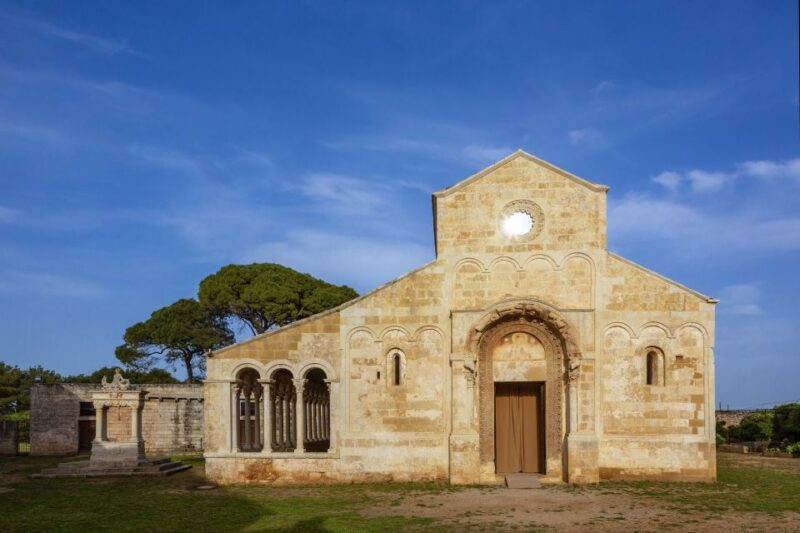
Just a short drive from the Abbey of Santa Maria di Cerrate, travelers can explore a variety of captivating attractions that showcase the rich culture and history of the Lecce region.
The stunning city of Lecce itself, known as the ‘Florence of the South,’ is famous for its exquisite Baroque architecture, particularly the Basilica di Santa Croce. Visitors can also head to the ancient Roman amphitheater, a testament to the city’s rich past.
For nature lovers, the nearby Otranto coastline offers breathtaking views and beautiful beaches.
Plus, the charming town of Galatina, renowned for its frescoed churches, is just a short trip away, making it easy to take in the diverse offerings of this enchanting area.
Frequently Asked Questions
What Are the Opening Hours of the Abbey of Santa Maria Di Cerrate?
She’s curious about the Abbey’s opening hours. Typically, it opens daily, welcoming visitors from morning until late afternoon. It’s best to check their website for any seasonal changes or special events affecting the schedule.
Is There a Gift Shop On-Site for Visitors?
Visitors won’t find a gift shop on-site during their visit. However, they can explore local shops in the surrounding area, where they can purchase unique souvenirs and regional products to remember their experience.
Are Photography and Videography Allowed Inside the Abbey?
Visitors can’t use photography or videography inside the abbey. They must respect the sacred atmosphere and cultural significance, ensuring a serene experience for everyone. However, capturing memories in the garden is allowed.
Can I Bring Food and Drinks to the Abbey?
Visitors can’t bring food and drinks into the abbey. However, they’re welcome to enjoy refreshments in the garden and courtyard areas, ensuring a pleasant experience while respecting the site’s historical significance.
Are There Any Special Events Held at the Abbey Throughout the Year?
The abbey hosts various special events throughout the year, including cultural festivals and art exhibitions. Visitors often enjoy unique experiences that highlight its rich history and architectural beauty, creating memorable moments for all attendees.
Recap
The Abbey of Santa Maria Di Cerrate stands as a testament to Lecce’s rich history and cultural heritage.
Its stunning architecture and captivating frescoes invite visitors to appreciate the artistry of the past.
With ongoing restoration efforts, this site not only preserves history but also offers a glimpse into the region’s agricultural traditions.
For anyone exploring Lecce, the abbey promises an enriching experience, blending beauty, history, and accessibility in one remarkable destination.
You can check availability for your dates here:More Tour Reviews in Lecce
- Lecce: Taranto and Manduria Winery Tour with Wine Tasting
- Lecce: Baroque Architecture and Underground Walking Tour
- Lecce Home Cooking Class: Craft Orecchiette & Savor Wine
- CAVES LEUCA TOUR WITH SKIPPER 3 HOURS
- Lecce: Baroque Walking Tour with Personal Shopper
- Corso di Pizzica : ballo tipico salentino con degustazione
Not for you? Here's more nearby things to do in Lecce we have reviewed
- Lecce: Taranto and Manduria Winery Tour with Wine Tasting
- Lecce: Baroque Architecture and Underground Walking Tour
- Lecce Home Cooking Class: Craft Orecchiette & Savor Wine
- CAVES LEUCA TOUR WITH SKIPPER 3 HOURS
- Lecce: Baroque Walking Tour with Personal Shopper
- Corso di Pizzica : ballo tipico salentino con degustazione
- Lecce: Guided Street Food Walking Tour with Food and Wine
- Lecce: Alberobello, Locorotondo, Ostuni & Apulian Brunch
- Unusual Lecce: Stories, Alleys, and Stone Lace
- Lecce: Tour Salento coast to coast
- Lecce: Traditional Pasta Cooking Class with Wine
- Lecce: Guided Sightseeing Walking Tour
